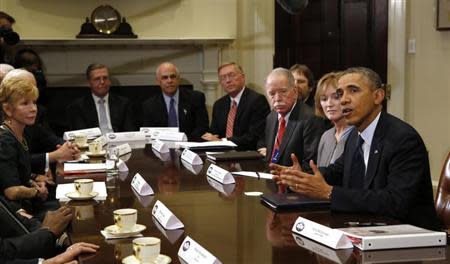White House again delays healthcare mandate for employers

By Patrick Temple-West WASHINGTON (Reuters) - The Obama administration on Monday again delayed a contentious healthcare law requirement that requires all but the smallest employers to provide coverage to full-time workers, this time by giving medium-sized businesses another year to comply. The so-called employer mandate, which has been opposed by businesses, was supposed to take effect in January. The administration granted a one-year delay in July. The latest change in the Patient Protection and Affordable Care Act, known as Obamacare, triggered another wave of Republican calls to postpone a mandate for individuals that requires most Americans to enroll in coverage by March 31 or pay a penalty in their 2014 income taxes. "Much like the individual mandate, the business mandate is bad for middle-class families and it will harm economic growth. But the answer to this problem is not random unilateral changes, stoking uncertainty," House Republican Majority Leader Eric Cantor said in a statement. "It's time to stop creating more chaos and delay Obamacare for all Americans." Analysts said the change could help vulnerable Democrats in November's midterm elections battle for control of Congress by delaying a potential crescendo of complaints from small-business leaders, a theme Republicans also picked up on. "It is clear Democrats don't think they can survive politically if Obamacare is allowed to fully go into effect," said Dave Camp, Republican chairman of the powerful House Ways and Means Committee. In a final version of the regulation released by the Treasury Department, the administration said firms with 50 to 99 full-time employees that are not already offering coverage would not face a tax penalty for failing to offer health insurance until 2016. Firms with fewer than 50 full-time workers are not required to provide coverage under Obamacare but could qualify for federal subsidies through new health insurance marketplaces. The latest change also allows larger companies to begin offering health coverage to only 70 percent of their full-time workforce next year and 95 percent in 2016. Officials described it as a gesture to help employers cope with a new definition of full-time employment that begins with an average of 30 hours a week. It also allows employers to determine whether an employee is full-time by averaging work hours over a period of up to 12 months. President Barack Obama's signature domestic policy aims to extend health coverage to millions of uninsured Americans by allowing individuals and smaller employers to purchase subsidized private health insurance in new marketplaces set up in all 50 states. The rules finalize draft proposals issued in December 2012 and took into consideration comments from businesses and congressional members, the Treasury Department said. The regulations clarify that government volunteers, such as firefighters and emergency responders, are not considered full-time employees -- an uncertainty that worried state and local governments. Teachers and other education employees will not be treated as part-time for the year even though their schools are closed or their work hours are limited in the summer, the rules said. Additional safe harbors in the rules aim to make it easier for businesses to determine whether the coverage they offer is affordable to employees. (Additional reporting by David Morgan; Editing by Karey Van Hall, Peter Cooney and Amanda Kwan)

